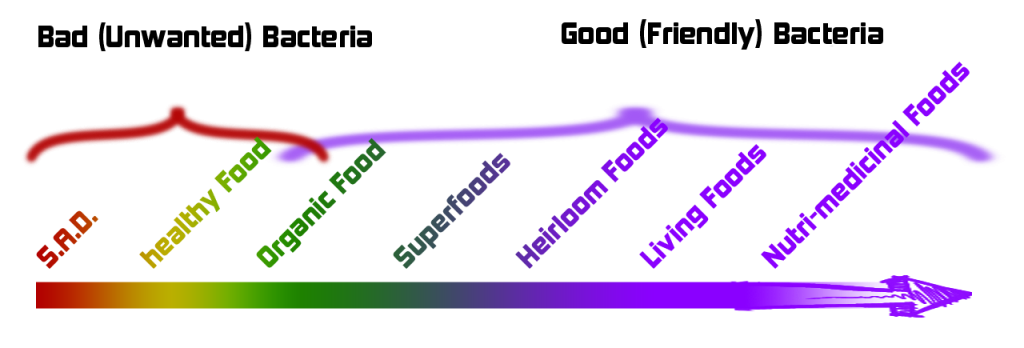The word gluten has a bad connotation and is immediately linked to gluten allergy, celiac disease, leaky gut and other modern day medicine terms.
Again, language can be tricky, but when you know and master the system you can survive blindfold in any language.
Here’s the deal… I created a picture of the food cycle to organize my thoughts, this became sort of like the apple that fell on Newton’s head when he discovered the law of gravity. In my case, I began to understand protein in a way few people understand it.
See our bodies are not designed to absorb proteins. Your body makes its own protein from amino acids.
Protein simply means amino acids joined together, much like complex carbohydrates (starch) are a bunch of simple carbohydrates joined together.
When you eat “protein”, the body’s enzymes first break it down into simple amino acids and then it builds its own protein. When the body builds protein, it ‘registers’ the protein into your DNA that way it knows it was you who created the protein. If the body comes across a protein that is not registered in your DNA it treats it as an intruder and attacks it. This is what an allergic reaction is.
Whenever you eat protein which the body can’t break down into amino acids, and the body can’t flush out, your body will attack that protein and build mucus around it.
That’s why allergy season your nose gets stuffed with mucus… that’s why people with leaky gut or gluten allergies will poop out mucus. That’s your body protecting itself from an undigested protein in your body…
Gluten is just a protein… but just like starch, not all Gluten is created equal. Just like the Peruvian papa, Einkorn is the original wheat.
Einkorn is native to East Turkey where the soil has the right amount of minerals, water, pH, temperature and enzymes. Like the Peruvian papa, Einkorn is able to grow in East Turkey without the need to use pesticides, insecticides, fertilizers, or anything that nature doesn’t already provide. In East Turkey, einkorn grows naturally and it’s as healthy as it can be.
When you take it out of its native land and soil, einkorn can lack minerals and begin to get sick. If that happens, then eating sick einkorn will make you sick.
That’s what happened when Einkorn was moved West and was what began the hybridization of wheat. Just like potatoes, you create gnarly starches that need more water and minerals to be broken down. Starch however is not the only thing that changes, gluten is another thing that changes.
To understand how this affects you, you must understand that the way your body digests food is through enzymes and bacteria. Bacteria create digestive enzymes and break down food for you. You are a host to bacteria, and bacteria like many other creatures live anywhere they are allowed to live.
When you are healthy, you have only good bacteria that is in harmony with you. You must have good bacteria in your body. When you don’t have good bacteria you are not going to be as healthy since you open up the doors to allow bad bacteria and insects to come in and eat you.
This is what happens to plants and it’s what happens to Einkorn and the papa when they get sick. You can tell if a plant is sick by looking for holes in the leaves and checking for other plagues.
To make wheat resistant to bugs, insects and bacteria it was bred so it would create a strong protein (modern day gluten). This strong protein keeps bacteria in the wheat growing fields from eating the grain. However, if that bacteria can’t digest the protein that protects modern day wheat, then your body’s bacteria (in part the same bacteria) will also fail to digest it and you are left with an undigested protein and a possible allergic reaction.
This begins to paint a picture in your mind that eating foods closer to the right side of the spectrum is the best choice because that’s what friendly bacteria like to eat and can fully digest.

Foods on the right side are healthy and they have all the minerals, water, enzymes, pH, and temperature that your body needs.
Starch robs your body of water and minerals. Gluten is a protein hard to digest. The last two statements refer to the modern day version due to hybridization of plants. Understand that the fundamental problem is NOT the starch, or gluten itself, but how and/or where the seed or plant was grown.
Carbohydrates hydrate you, and amino acids build you. These don’t work separate, they work together as is the case with fats and amino acids.

2 replies to "What if Gluten is Good For You?"
Jorge you are AWESOME ! Thank you so much for doing all this work for us.
Much love.
Celeste
You are very welcome Celeste!! glad you are finding it helpful! 🙂